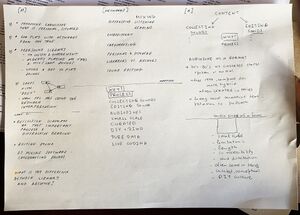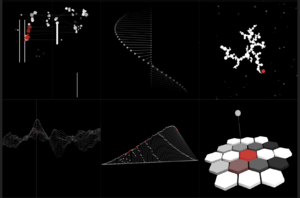Al's XPUB2 proposal draft: Difference between revisions
| Line 110: | Line 110: | ||
* what are the characteristics of these places and how to use them in relation to our jam? | * what are the characteristics of these places and how to use them in relation to our jam? | ||
'''[publics]''' define different publics and test with them; who is also doing something similar in the area? | '''[publics]''' define different publics and test with them; who is also doing something similar in the area? <br> | ||
'''[xpub]''' | |||
* check with tutors: places in Rotterdam where we can make jams + do we have budget to rent rooms & equipment; read & works recommendations on audiozines and sound publications | |||
== <span style="color: white; font-family: Menlo; text-decoration:none; background-color: #0033ff; padding-top: 0.1vw; padding-bottom: 0.1vw; padding-left: 0.1vw; padding-right: 0.2vw;"> Relation to previous practice </span> == | == <span style="color: white; font-family: Menlo; text-decoration:none; background-color: #0033ff; padding-top: 0.1vw; padding-bottom: 0.1vw; padding-left: 0.1vw; padding-right: 0.2vw;"> Relation to previous practice </span> == | ||
Revision as of 23:49, 2 October 2022
// back to Ål's main page
// back to Graduate Seminar
Questions
- What do you want to make?
- How do you plan to make it?
- What is your timetable? [stages] [deadlines]
- Why do you want to make it?
- Who can help you and how?
- Relation to previous practice
- Relation to a larger context
- References/bibliography
- Who is the work for (part of why do you want to make it)
What do you want to make?
[collaborative research] this project is being done [partially] in collaboration with mits🤖. Together, we aim at researching and working on sound as a format for our project/s.
[for the final graduation moment] i would like to make a sound performance and/or sound installation using the audiozines, created during our research during the whole year [could make a rhythm of making one zine per month, e.g.]. Those zines would be also documented in printed zine versions [the two formats can also go together - transmedia storytelling - like some part of the content is only on the printed zine; some - on the audio].
I am struggling with finding my research question.
What could it be about? I have many ideas, some of them are:
- methods to create audiozines?
- methods to create collective audiozines?
- parallel diaries - ways to connect each other by recording something in the same moment
- sounds from the public spaces (to what sounds, noises are we exposed) - like at 1:30 AM roadworks next to my room [collect field recordings + add my personal emotions to those moments with music/abstract sounds + add keywords/illustration]
- recording the sounds of the body (hugging...)
Interested in facilitating jams. Research pad about that is here.
[notes from interviews]
-one audio part - a sound pub - can be placed in many ways
-physical zine
-process of scheduled zine creation (they become a collection to use for performing and make a documentation of)
-improvised creations - sketches in sound
-the ideas: very meta; what are the actual contents of the zines? they can be records of specific moments - what is the criteria, how do you choose these moments and with whom
-it is about the structure and not about the topic
-put a deadline for topic exploration - until when it's ok to not know it :D
Why do you want to make it?
Last year I loved the format of weekly releases - doing small experiments and reflecting on some topics/ideas with sound (and sometimes an image). I imagine that the experiments can then build up a bigger topic and research question.
I am looking for a research question that can include collecting data through sound.
[notes from the interview]
-the places where we do them will bring context
-find a pattern
-what is for myself the relevance of this research question? why is it important?
How do you plan to make it?
I would like to try out the following:
_1 - collect and map methods to collect sound; also ways to edit it and looking for the reasons behind both choices of method;
_2 - starting doing small experiments with different ways to create sound (computer-base and analog, by jams, by field recording) - I feel like I need to try some of them out first (explain what is electronic and what analog);
_3 - creating small experiments with a particular ask/question/intention behind - in search of the research topic maybe?
_4 - recording sound, mixing it due to some concept and then creating small zines to see how it's going to look like
_5 - idea to create an instrument (maybe facilitating sessions when others play with this instrument with an assignment to create something specific)
_6 - idea of using Room for sound - invite residents to participate - diffractive mixing of their contributions
[notes from the interview]
>> the final performance can be a diffractive listening to the different publications - thus, creating a new one (question: why? what will that bring?)
_I really have the audiozine format - speaks about the velocity and easiness to collect and distribute them - easy to distribute;
_what are the characteristics of the zine to experiment in the context of these ideas - e.g. common characteristics of the zine that can frame the experiment
What is your timetable?
october - ways to collect and edit sound + documenting
1_ reflect on the mixing we did - to unpack what we did // with Mitsa
2_ schedule jams and collecting sounds moments // with Mitsa
3_ filed recording experiments // 10-14 oct
4_ public moment in leszaal - ??? what to do // (idea of sound installation or recording people doing stuff)
outcomes:
_documentation and raw-raw draft of proposal
_field recordings
_sounds created
_experiments with edited sound
_pure data experiments
november - ways to collect and edit sound + proposal draft
1_ get inspiration // 25 nov Arooj Aftab, Lucrecia Dalt live
2_ prototype of audiozine + print zine - test the combo - put all experiments together
3_ edit music and sound + document methods
4_ explore topics: what makes all the experiments so far come together?
5_ thesis outline - what form will it take (a report of the research and practice?)
outcomes:
_proposal ready // 18 nov
_thesis outline (form) // 18 nov
_prototype of audiozine
_topics drafting start
Who can help you and how?
[space] would like to try out different spaces and locations in rotterdam; also inviting different people and orchestrating jams with various publics [when that is possible]
- make a list with spaces that we are interested in making jams in;
- what are the characteristics of these places and how to use them in relation to our jam?
[publics] define different publics and test with them; who is also doing something similar in the area?
[xpub]
- check with tutors: places in Rotterdam where we can make jams + do we have budget to rent rooms & equipment; read & works recommendations on audiozines and sound publications
Relation to previous practice
Relation to a larger context
References/bibliography
WIP
reads
Evens, A., 2005. Sound Ideas: Music, Machines & Experience. U of Minnesota Press [annotated pad]
sound publications
Brown, A. R., 2022. Beneath Maiwar.[online] Available at: <https://www.explodingart.com/arb/2022/06/28/beneath-maiwar/> [Accessed 30 September 2022]. [annotated pad]
Nagy, A., 2018. Hackpact / Sonification Studies. [online] Available at: <https://stc.github.io/HackPact/> [Accessed 30 September 2022]. [annotated pad]
Who is the work for?
_educators: people who are facilitating various educational activities and are looking for ways to bring more mixed media in their activities;
artists: who are looking for new techniques for their practice and ways to experiment, boost their creative process; to find more ways to reflect over topics and contents;
_tba: who else? tba
Archive
▶ the first draft pad [created during the Graduate Seminar on 29-09-2022]


